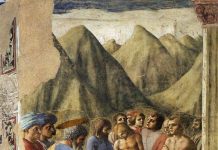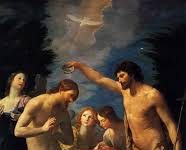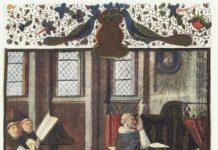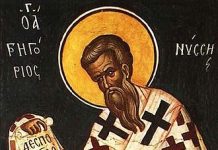Around this time of year in the Office of Readings, or Lauds, we follow the travails of the prophet Elijah from the Book of Kings, his battle with the Ahaz, the false prophets of Ba’al, the whole spiritus mundi – and the Jezebel behind the throne. He was indeed a ‘burning fire’, refusing to compromise or capitulate. His vocation began with his retreat in the cave on Mount Horeb, wherein he heard God’s voice not in the thunder and earthquakes and the rending of rocks, but in the ‘still, small voice’, a whisper, even, in the original Hebrew, ‘silence’.
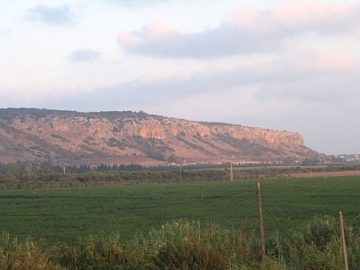
(wikipedia.org)
It was in that same Holy Land, in silence, that devotion to Our Lady of Mount Carmel, as well as the Order devoted to her, began. Carmel is the place, praised in Scripture for its breathtaking natural beauty, a very image of heaven, where Elijah was said to dwell in a grotto on its highest point, 1700 feet above the Mediterranean Sea. Here, the prophet challenged the 450 said prophets of Ba’al to a sacrificial contest, to see whose God was the true God. Tradition has it that Jewish hermits continued to live there, until the founding of the Carmelite Order in the late 12th century, during the Crusades. If the Christians could not attain ultimate victory by the sword, they could by the life of prayer and conversion. Our Catholic foothold – or, perhaps, soul-hold – in the Holy Land has been unbroken ever since.
No one knows who the human founder is – there is a reference to a ‘Brother B’ in the original rule given by Albert, the Latin Patriarch of Jerusalem in 1210. We may believe that God was the founder through His Mother, in that ‘still, small voice’, through Elijah. What we do know is that a monastery was built there in the early thirteenth century, and the Carmelite way of life – hidden, simple and beautiful, consisting of prayer, contemplation and work – spread throughout the world. That first monastery on the hill of Carmel has had a history as troubled as the land itself, becoming a mosque, then a hospital, then a mosque again, then destroyed; but, thankfully, it is now again a Carmelite monastery, and we may hope is so until Elijah returns, in fire, on that great and terrible day of the Lord. (As a point of interest to some readers, it’s at this convent that Father Elijah lives in Michael O’Brien’s novel of the same name – there is something apocalyptic about Our Lady of Mount Carmel, as there are of all Marian visions, I suppose, as Our Lady leads us from this passing world to our heavenly home. This is also the anniversary of the final vision to Saint Bernadette Soubirous at Lourdes, in 1848, and Our Lady of Fatima, in her final apparition, appeared as the Virgin of Carmel. On a less felicitous note, it’s on this day that the first atomic bomb was tested, at Alamagordo, New Mexico, in 1945. They even called the test ‘Trinity’, for reasons that, as far I have been able to discover, are unclear.
July 16th is chosen as the feast of Our Lady of Mount Carmel in commemoration of the vision given to Saint Simon Stock, an English Carmelite, in 1251, of the brown scapular. By its wearing, we share in the spiritual benefits of Carmelites throughout the world, and through which many promises are given. But the main purpose of the scapular – a sacramental version of the larger scapular worn by fully-professed members of the Order – is not a guaranteed amulet to gain us paradise. Rather, its wearing is to remind us of our own promises made in our Baptism, to share in some way in the spiritual work of the enclosed Carmelites, to keep watch, guard and live the Faith through thick and thin, to honour God, His Mother and all the saints, as we pilgrimage in our unique vocations in this life to eternity.
Our Lady of Mount Carmel, ora pro nobis!


